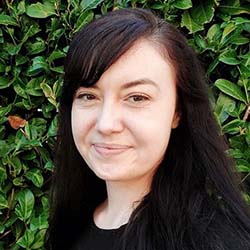Nguyen Lab
At the Nguyen Lab, we are driven to discover new ways to promote functional kidney repair and prevent the progression of chronic kidney disease. The kidney can be damaged by disease as well as common events such as infection, surgery, and medication. When injured, its ability to fully recover is compromised, often leading to progressive and irreversible chronic kidney disease. While current treatments can slow this decline, there are no therapies that can repair damaged tissue, highlighting the urgent need for new insights.
Our research decodes the complex interplay between genetics and epigenetics in the kidney’s response to injury and disease. By understanding the regulatory elements and gene expression pathways involved, we aim to redirect the cellular response away from scarring and toward tissue regeneration. We conduct this work by combining findings from both basic and translational research. We study animal models that have the remarkable ability to regenerate tissue after injury, and we apply these insights to human genetics, with the goal of identifying mechanisms for functional repair.
Our collaborative work unites clinicians and scientists, translating our genetic discoveries into tangible solutions for patients. This effort is deeply integrated with my mission as the co-director of the Kidney Genetics Clinic at Seattle Children's, where we are dedicated to improving care by expanding genetic diagnoses with equitable access, comprehensive education, and advanced research.
Epigenetic Regulation of Kidney Regeneration
The progression of kidney injury to chronic kidney disease is an irreversible process, placing an immense burden on patients and the healthcare system. With no treatments available to reverse a scarred, or fibrotic, kidney, our research focuses on identifying mechanisms that could promote kidney regeneration, offering a new path forward for this significant health challenge.
My long-term goal is to identify mechanisms that redirect the outcomes of kidney injury away from fibrosis towards repair. Therapies targeting regeneration of kidney tissue will greatly impact the 35 million individuals in the United States living with chronic kidney disease.
We have found that epigenetic control of gene expression directs the outcomes after kidney injury. A major focus of our investigation is on nucleosomes, which are complexes that wrap DNA and control which genes can be accessed and expressed. This regulation is governed by modifications to the histone proteins that make up the nucleosomes. Histone modifications play a critical role in dynamic cellular processes like development and disease.
Our research aims to understand how histone modifications activate unique gene regulatory networks to drive kidney repair following injury. By understanding how these pathways are epigenetically regulated, we hope to provide insights into how kidney regeneration can be activated in humans, ultimately leading to therapeutic strategies that can redirect kidney injury toward the repair of functional tissue.
Advancing Genetic Diagnosis in ADPKD
In collaboration with Drs. Alex Keefe and Danny Miller, we are pioneering a novel approach to detect "hidden" genetic variants in cystic kidney disease, specifically Autosomal Dominant Polycystic Kidney Disease (ADPKD).
Despite ADPKD being the most common inherited kidney disease, standard genetic testing often fails to identify the molecular cause in a significant number of patients. This is due to the large, complex nature of genes like PKD1 and PKD2, which are characterized by high GC content, homologous pseudogenes, and the potential for somatic mosaicism.
Our research proposes to overcome these challenges by combining Long-Read Sequencing (LRS) with DNA extracted from urine. LRS is an emerging technology capable of reading DNA molecules thousands of bases long, making it uniquely suited for detecting structural variants and analyzing the complex genomic regions often missed by current short-read methods. The use of urine, which contains DNA from kidney cells, offers a unique, non-invasive "liquid biopsy" to obtain tissue-specific genetic information.
This innovative approach is expected to significantly increase the diagnostic rate for cystic kidney disease and reduce barriers to testing. If LRS can accurately detect genetic variants from a simple urine sample, this could establish a new gold standard for obtaining tissue-specific genetic information from individuals with kidney disease, ultimately leading to improved patient outcomes.

Elizabeth Dong Nguyen, MD, PhD
Dr. Nguyen is an assistant professor in the University of Washington School of Medicine's Department of Pediatrics and a principal investigator at Seattle Children's Research Institute. As co-director of the Kidney Genetics Clinic at Seattle Children's Hospital, she is dedicated to improving patient care by expanding genetic diagnoses and providing equitable access to advanced research and education. A physician-scientist, Dr. Nguyen completed her medical and graduate degrees at Vanderbilt University, where her research focused on protein structure prediction and drug design. She then completed her pediatric residency and pediatric nephrology fellowship at Seattle Children's Hospital. Today, she balances her time between patient care on the pediatric nephrology service, leading her research team and teaching the next generation of trainees. Her clinical interests are centered on the genetic causes of kidney disease.
-

Jackie McDonald
Research Scientist III
Jackie received her B.S. in Molecular and Cellular Biology from the University of Arizona. She began her career at the Translational Genomics Research Institute, working in the sequencing center. After relocating to Seattle, she spent nine years in the Myler lab, where she developed assays and data analysis pipelines to study the transcriptional and epigenomic landscape of Leishmania. She then completed a year of training in computational biology with the Research and Scientific Computing team at Seattle Children’s Hospital through the Retaining Excellence program. Jackie is excited to bring her combined wet and dry lab experience to the Nguyen lab, where she investigates the functional genomic mechanisms underlying kidney disease.
-

Ben Tickman, PhD
Research Scientist III
Ben completed his undergraduate studies at the University of Washington, earning degrees in Biochemistry, Biophysics, and Chemistry in 2014. He continued his education at the University of Washington, where he earned a Ph.D. in Molecular Engineering in 2021. His doctoral research focused on synthetic biology and the development of dCas9-based genetic control systems for metabolic engineering. Outside of his scientific pursuits, Ben enjoys a variety of outdoor activities, including gardening, skiing, trail running, and mountaineering.
Former team members
- Joshua Gere (former research technician, now employed at Fred Hutch Cancer Research Center)
- Kiheon Suh (former research technician, now a student with the University of Washington School of Medicine)
